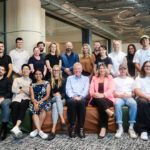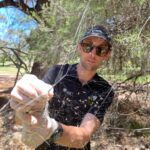A $145,000 Inspiring Australia – Unlocking Australia’s Potential grant will allow the general public to get involved with Curtin University’s most ambitious meteorite project.
The grant will support the creation of Fireballs in the Sky, a project which builds on the work of ARC Laureate Fellow Professor Philip Bland of Curtin’s Department of Applied Geology. His ARC and Curtin-funded project Meteorite Fireballs: Illuminating the Origins of the Solar System will use a network of cameras in desert regions of Australia to capture images of incoming meteorites. Data will then be coordinated to find the origins of these ‘shooting stars’ as well as the location of the fallen specimens.
Professor Bland said the complementary Fireballs in the Sky would allow people of all ages and backgrounds to participate in authentic science research.
“Fireballs in the Sky will revolve around a website where people can view photos, videos and data from meteorites coming into the atmosphere as well as upload their own information on sightings,” Professor Bland said.
“A smartphone application is being developed to help people share positioning, luminosity, time of entry and magnitude, which will be verified by researchers and posted on the website.
“Together, we’ll be building what is effectively a composition map of the inner solar system.”
Professor Bland said participants would be able to interact via Facebook and Twitter, webinars, workshops, talks and more. There are even plans for tours and meteorite recovery programs.
The project spans Western Australia, South Australia and the Northern Territory and relies on urban and regional participation.
Professor Bland said he was excited about the inclusion of indigenous knowledge about meteorites in future events, noting it was a nice synergy of science, culture and history.
“This project is about taking planetary science research out of the lab and into people’s everyday lives,” Professor Bland said.
The project will be delivered by Curtin University and a number of partners: Scitech, Perth; CRC for Remote Economic Participation, Alice Springs (Ninti One); Science Teachers Association of Western Australia; Kalgoorlie-Boulder Visitor Centre; Imperial College, London; and the Western Australian and South Australian Museums.
The trial phase of Professor Bland’s project Meteorite Fireballs: Illuminating the Origins of the Solar System is already the most successful meteorite recovery project in history.
Fireballs in the Sky is being facilitated by the successful and long-running Curtin Science Outreach, a finalist in the 2011 WA Science Awards.
This Inspiring Australia initiative is supported by the Australian Government through the Department of Industry, Innovation, Science, Research and Tertiary Education in partnership with Curtin University.
Contact:
Professor Philip Bland, Department of Applied Geology, Curtin University
Tel: 08 9266 9763, Email: p.bland@curtin.edu.au
Denise Cahill Public Relations, Curtin University
Tel: 08 9266 1931, Mobile: 0401 103 683, Email: d.cahill@curtin.edu.au
http://science.curtin.edu.au/outreach/fireballs-in-the-sky.cfm


